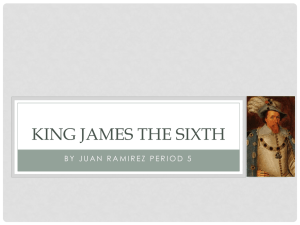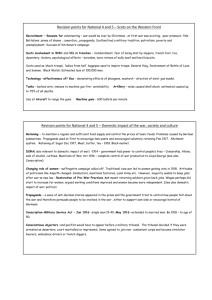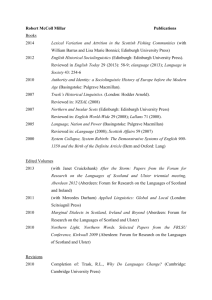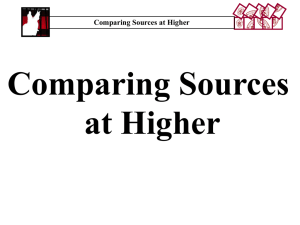Open - The Scottish Government
advertisement
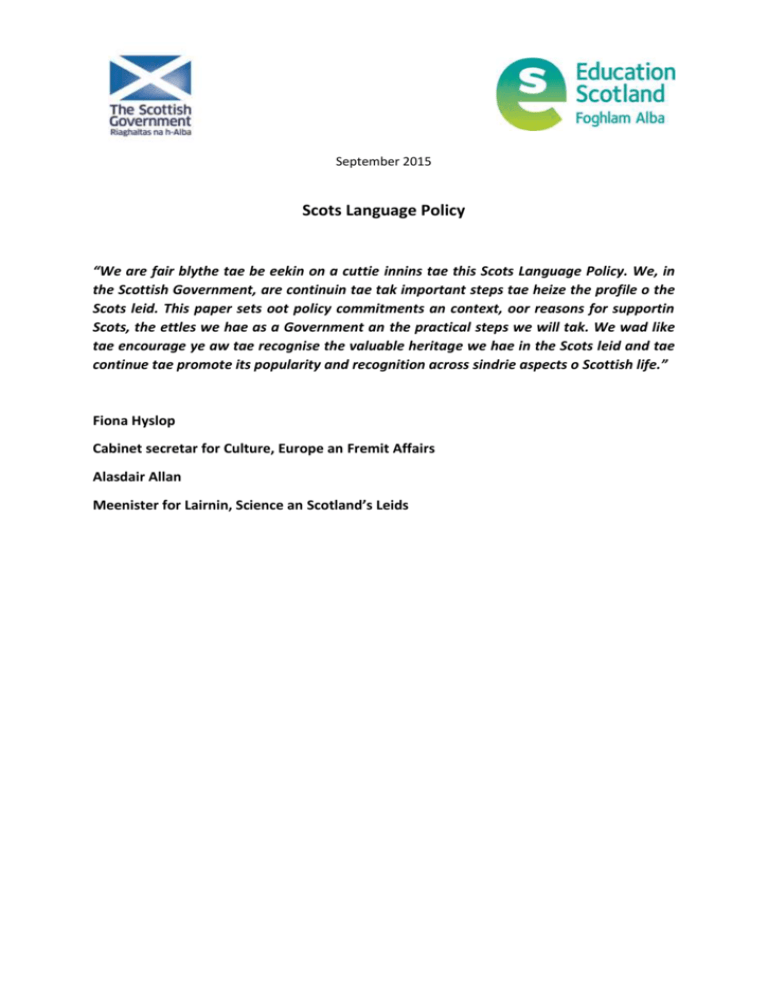
September 2015 Scots Language Policy “We are fair blythe tae be eekin on a cuttie innins tae this Scots Language Policy. We, in the Scottish Government, are continuin tae tak important steps tae heize the profile o the Scots leid. This paper sets oot policy commitments an context, oor reasons for supportin Scots, the ettles we hae as a Government an the practical steps we will tak. We wad like tae encourage ye aw tae recognise the valuable heritage we hae in the Scots leid and tae continue tae promote its popularity and recognition across sindrie aspects o Scottish life.” Fiona Hyslop Cabinet secretar for Culture, Europe an Fremit Affairs Alasdair Allan Meenister for Lairnin, Science an Scotland’s Leids September 2015 A Scots Language Policy The Scots language is an essential element o the culture an heritage o Scotland. For mony o us, it is a weel-kent aspect o oor sang, poetry and literature and a kenspeckle feature o the wey we express wirsels in oor community life. The Scots leid is only spoken within Scotland and it is no yaised onywhaur else in the warld by a community o significant nummer or extent. Therefore steps maun be taen within Scotland, tae mak its preservation siccar. The 2011 census indicatit that mair nor 1.5m folk identifeeit theirsels as Scots speakers. It is, therefore, richt that Scots shuid continue tae be refleckit in education, airts, media an mair. The Scottish Government will heize an uphaud Scots and encourage its respect an recognition in order that, whit for mony is the language o the hame, can be yaised in ither areas o Scottish life. Policy Context This policy haes been prepared in response tae a Scottish Government manifesto commitment. Alang wi the manifesto commitment there are ither statements an commitments ablow whilk demonstrate the policy context that Scots is set in an the level o priority bein accordit by Scottish Ministers tae the Scots language. Manifesto Commitments In 2011 the Scottish Government adoptit manifesto commitments on the Scots language. The Scottish Government greed tae ‘develop a national Scots language policy, with increased support for Scots in education, encouragement of a greater profile for Scots in the media, and the establishment of a network of Scots coordinators’. A previous Scottish Government manifesto commitment said we wad ‘introduce a question on Scots in the census’. This question wis in the 2011 Census an mair nor 1.5 million folk in Scotland identifeeit theirsels as Scots speakers. Cooncil o Europe The Scottish Government supports as weel the application o the provisions o The Cooncil o Europe’s Charter on Regional or Minority Leids. The Scots provisions include the unnertakkins that policies shuid be foondit on recognition o the regional September 2015 or minority languages as an expression o cultural walth an include as weel the need for resolute action tae promote regional or minority languages. The unndertakkins include as weel the facilitation an encouragement o the yiss o Scots in speech and scrievin; in public and private life; the provision o appropriate forms and means for the teachin and study o Scots, an mair. Culture Scots an culture are inextricably linkit. As baith a spoken an scrievit leid wi a pedigree raxin back centuries, it continues tae hae a distinctive impact on Scottish society. Scots sang, poetry, literature an drama hae a strang tradition an Scots can be seen as weel tae influence mair immediate aspects o modren life throu television, film an its increasin popularity in social media. Tae ensure sustainable cultural growth for Scots it is important that the media and publishin warlds are encouraged tae engage wi their Scots speakin audience. A language o the people, fae Border ballads tae bairnsangs, an fae post office queues tae parliamentary records, Scots is as vibrant an varied as its speakers the day. Curriculum In the Literacy and English: Principles and Practice document (2009)1, ane o the key documents o Curriculum for Excellence, it says o Scots that, ‘the languages, dialects and literature of Scotland provide a rich resource for children and young people to learn about Scotland’s culture, identity and language. Through engaging with a wide range of texts they will develop an appreciation of Scotland’s vibrant literary and linguistic heritage and its indigenous languages and dialects. This principle suffuses the experiences and outcomes and it is expected that practitioners will build upon the diversity of language represented within the communities of Scotland, valuing the languages which children and young people bring to school.’ Scottish Studies 1 The Scottish Government greed an aw tae ‘develop the concept of ‘Scottish Studies’ in our schools, creating a distinct strand of learning focused on Scotland incorporating Scottish History, Scottish Literature, the Scots and Gaelic Languages, wider Scottish culture and Scottish current affairs. All pupils will have access to this strand at Primary and Secondary levels’. http://www.educationscotland.gov.uk/learningteachingandassessment/curriculumareas/languages/litandenglish/ principlesandpractice/index.asp September 2015 Ministerial Working Group The Scottish Government futhermair establisht a Ministerial Wirkin Group on the Scots Language. This Group produced a Report wi recommendations2 in 2010 an the Scottish Government continues tae act in accordance wi thir recommendations. Rationale This section briefly lists the key reasons why the Scottish Government values an promotes the Scots language. The Scottish Government values the linguistic heritage o aw o the people o Scotland and recognises Scots as an essential pairt o this. The Scottish Government recognises Scots as ane o the three historical indigenous languages o Scotland alang wi Gaelic and English. The Scottish Government acknowledges the importance o recognisin, promotin and developin the Scots language in aw its regional varieties. The Scottish Government recognises the richness o the Scots language as expressed in sang, poetry and literature. The Scottish Government regairds Scots, in its scrievit and spoken forms, as a valid means o communication. The Scottish Government recognises the important role that scuil education haes in promotin the yiss o Scots. Aims The Scottish Government recognises that the Scots language is an integral pairt o Scotland’s heritage, national identity an current cultural life. The Scottish Government, wirkin wi ither pairtners in Scottish public an community life, will be guidit by the ettles ablow: 2 enhance the status o Scots in Scottish public an community life; promote the acquisition, yiss an development o Scots in education, media, publishin an the airts; http://www.gov.scot/Publications/2010/11/25121454/1 September 2015 encourage the increased yiss o Scots as a valid an visible means o communication in aw aspects o Scottish life. Practical Steps In order tae further thir aims, the Scottish Government will endeavour till: create awareness amangst aw stakehauder groups that Scots is ane o the three historical indigenous languages o Scotland and shuid therefore be affordit equal respect; promote a coherent approach tae the planning, lairnin, teachin an assessment o Scots within the context o relatit national policy an the national Curriculum for Excellence (CfE) implementation plan; provide access tae relevant resoorces whilk encourage the yiss an study o Scots within the framework o relatit national policy an the CfE implementation plan; encourage aw stakehauder groups tae develop an implement Scots language policies; continue tae provide support for organisations whilk actively contribute tae the preservation an promotion of Scots language; an, encourage pairtnership wirkin atween aw groups an bodies wi an interest in supportin the Scots leid. September 2015 Scots Language Policy Appendix The Scottish Government’s manifesto commitment includit the establishment o a network o Scots co-ordinators an aw. This network haes been establisht an is locatit in Education Scotland. Their Action Plan is eikit ablow an includes further positive steps that the Scots coordinators are takkin tae uphaud the Scots language. Education Scotland: Action plan (March 2015 – April 2016): The Scots Language Coordinators will continue tae develop awareness amangst lairners, their faimlies an the wider community that Scots is a language. This will be achieved throu dedicatit wab space on the Education Scotland wabsteid, Glow, local press an engagement wi relevant organisations. the Scots Language Coordinators will help tae implement the National Scots Language policy while supportin local authorities, pairtners an individual institutions tae engage wi the document in weys whilk will encourage the yiss o Scots in developin literacy skills an addressin the Raising Attainment for All agenda Education Scotland will accept an value ony form o communication in Scots. As corporate signage, logo and strapline come up for renewal Education Scotland will deploy a trilingual approach as opposed tae the current bilingual approach. The Scots Language Coordinators will provide templates/suggestions for thae staff wha wish tae sign aff emails in Scots or include appropriate Scots greetins. Education Scotland will make siccar that a team within the organisation haes specific responsibility for promotin a coherent approach tae the plannin, lairnin, teachin an assessment o Scots within the context o relatit national policy an the Curriculum for Excellence implementation plan. The Scots Language Coordinators will develop a full progression in Scots tae mak explicit for practitioners, lairners and parents the links atween Scots and literacy. Education Scotland will collate and publish annotatit exemplification for assessment o Scots. Education Scotland will continue tae develop an uphaud the Glow online Scots language professional lairnin community. September 2015 The Scots Language Coordinators will continue tae develop an maintain Education Scotland’s dedicatit Scots wab space. The Scots Language Coordinators will continue tae develop resoorces tae enable teachers tae confidently an creatively engage wi Scots, wirkin wi sic pairtners as Historic Environment Scotland, the National Library o Scotland and Glasgow University amangst ithers. The Scots Language Coordinators will continue tae wirk wi pairtners sic as the Scottish Book Trust tae provide blogs whilk will encourage practitioners tae yaise Scots as a wey o developin transferable literacy skills. Education Scotland will ensure the implementation o the Adult Learning Statement of Ambition taks accoont o Scots language an culture. Education Scotland will inform an engage wi parents an carers aboot the place o Scots language in Curriculum for Excellence throu regular updates in Education Scotland’s e-bulletin for parents an carers, Parentzone3, an face tae face presentations at parent events whaur appropriate. As practitioner and local authority expectations o support for Scots in scuils hae been raised by the current level o Scots Language Coordinator engagement, Education Scotland will continue tae meet this demand for professional lairnin in weys that will contribute tae the Raising Attainment for All agenda while biggin practitioner capacity an confidence. The Scots Language Coordinators plan tae refine the Scots professional lairnin they offer tae hae a clearer focus on developin transferable literacy skills throu Scots. They will clearly link this CLPL approach tae the GTC Scotland Professional Standards, an will explore the possibility o haein this professional lairnin accreditit for Professional Recognition. Education Scotland will continue tae manage, promote and develop the Scots Language Ambassadors scheme, linkin it tae the new Scots Scriever residency at the National Library o Scotland an the Raising Attainment for All agenda 3http://www.educationscotland.gov.uk/parentzone/
